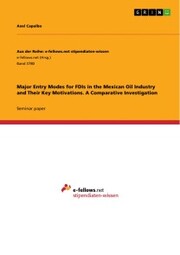-
Zusatztext
-
Seminar paper from the year 2017 in the subject Business economics - Business Management, Corporate Governance, grade: 76,0, Sheffield Hallam University, language: English, abstract: The present report reflects a profound evaluation of the performance, change and the economic-political relation between the government and foreign investors in one of the most prosperous and untouched oil markets: Mexico. Its oil market, whose growth in value is estimated to attain $54.9 billion in 2021, is equal to an increase of 79.4% since 2016.The origin of this object of research is attributable to two drivers. On the one hand, the subchapter about the extractive industries from the modules core reading "Global Shift" by Peter Dicken served as a starting point for the corresponding analysis. In contrast to this basic reference, the scope is narrowed down to the oil sector for the sake of a more concise and precise investigation. On the other hand, the topic as such deserves a closer examination due to the relevant, dynamic transformation process within a promising emerging economy, stimulated by governmental reforms from the past ten years enabling the liberalisation for the benefit of foreign MNCs.With this in mind, there arises the question of major entry modes practised by global players in the meantime to penetrate the Mexican oil sector. The corresponding answer provided in this document is structured as follows.The first chapter consists of a preview comprising the entire metamorphosis of the Mexican oil industry, starting with an overview of the formerly predominant conditions, continuing with a description of the recent energy reforms and their consequences, and ending with an outline of the latest modes of entry. In addition, these subchapters are informed with information on both the past and the present role of the Mexican nation-state, accompanied by strategic adjustments implemented by prominent intercontinental players at the respective time.Subsequently, the focus shifts towards the analytical core embedded in the second chapter. At this point, the contents draw mostly on theoretical frameworks related to the previously characterised modes of entry, allowing an ad hoc classification and juxtaposition of the FDIs, the key motivations to internationalise as well as of the anticipated advantages behind the entrepreneurial initiatives.Ultimately, all the aforementioned insights and key arguments are summarised in a brief concluding chapter.
-
Detailansicht
Major Entry Modes for FDIs in the Mexican Oil Industry and Their Key Motivations. A Comparative Investigation
eBook
ISBN/EAN: 9783346403261
Umbreit-Nr.: 2401264
Sprache:
Englisch
Umfang: 25 S., 1.73 MB
Format in cm:
Einband:
Keine Angabe
Erschienen am 10.05.2021
Auflage: 1/2021
E-Book
Format: PDF
DRM: Nicht vorhanden


